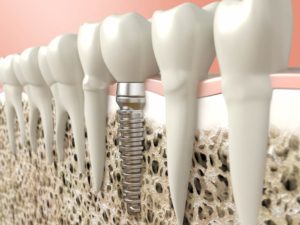
The unavoidable truth is that tooth loss is one of the most devastating things that can happen to your smile. According to the World Health Organization (WHO), around 30% of the world’s population over the age of 65 has lost all of their natural teeth. While tooth loss typically affects older patients, it isn’t a consequence of aging. Rather, it’s most often the culmination of one or more advanced dental diseases. New technological advances offer us dental implant solutions that will give us our lost teeth back.
Can you remember how excited you felt the first time you lost a tooth as a child? You may have been so anxious to do so, in fact, that you actually hurried the process along. Unfortunately, as an adult, the emotions that accompany tooth loss are rarely pleasant. They tend to involve embarrassment, frustration, and even anxiety. Tooth loss can also raise a lot of questions. “How will my smile function after tooth loss? Will I ever be able to chew comfortably again?” The good news is that dental prosthetics, like implants, make it possible to recover from tooth loss. In fact, you might be pleasantly surprised to learn just how comprehensively a dental implant could help to complete your smile!
Ready to Restore Your Smile After Tooth Loss?
Tooth loss might initially seem like purely a cosmetic concern, particularly if the tooth is towards the front of your smile. Unfortunately, even a single lost tooth can cause problems for the rest of the smile. When a tooth is missing, remaining teeth may try to shift to fill the created gap, leading to alignment problems that could be both embarrassing, cosmetically, and functionally troublesome. Eventually, misalignment of teeth can lead to discomfort or pain throughout the smile and the jaw.
Tooth loss can also cause the jaw to shrink, over time, eventually causing the entire facial structure to change. There must be enough bone to hold the implant root. There is also a minimum space for the implant to be placed.
An Implant Provides Extra Security
Dental implants are just one form of prostheses available. That said, they offer a number of benefits. Implants, specifically, help to address both missing teeth and the roots that once held them in place, allowing for better retention of the jaw’s structure. The mimic root also offers increased stability and security, essential to chewing comfortably and confidently. An alternative to an implant is a dental bridge.
Have you lost one or more teeth?
A dental implant replaces missing teeth. Fortunately, you can expect to replace any configuration of missing teeth with this solution. To understand candidacy as it relates to your preferences, it is important to understand your options. Consider the following:
- Single tooth replacement: You may make a good candidate for single implants if you would like to replace one tooth at a time with an implant and a dental crown. You can choose this treatment for one tooth, many teeth, or even a full arch of teeth.
- Multiple Implants: Some patients prefer to have fewer implants placed than teeth they need replaced. This often occurs when a patient is looking for a way to improve stability for a prosthetic like a partial or full denture, which we can outfit to rest securely over dental implants.
We place dental implants into your jawbone for lasting support. If your jawbone is not healthy, then you may not qualify as a candidate for implants. The good news is that bone grafting may provide you with the necessary jaw health improvement to qualify you for implants.
The Science of Tooth Replacement
Besides the visible gap in your smile, you may wonder why missing teeth are such a big deal. When your mouth is full of teeth, each tooth supports those next to it as they absorb the pressure from your bite. If you lose one or more of them, then replacing your missing teeth can help restore your bite’s balance, as well its cosmetic appearance.
Recovery after implant placement will require several months. If you are looking for a quick solution, we may need to discuss alternative options, like dental bridges. Dental bridges, dentures, and dental implant solutions can be custom-crafted to fit along your dental ridge, filling the empty spaces in your smile by replacing the visible portions of your teeth, called the crowns.
How are Dental Implant Solutions Different?
Dental implants stand apart from other more conventional teeth replacements in several aspects. Rather than replacing the crowns of your missing teeth, implants are surgically inserted into your jawbone. They are meant to replace the tooth roots. Dental crowns can then be attached to them. A dental implant is made from biocompatible titanium. As your jawbone heals around the titanium screw, it fuses to the implant’s surface.
Learn more a bout the treatment options for a lost tooth
Aside from providing dependable general and restorative dentistry services to our community, Dr. James Fondriest also holds respected academic appointments at the Pankey Institute in Key Biscayne, FL, and the Spear Institute in Scottsdale, AZ, and he is an adjunct Associate Professor in the Department of Prosthodontics at the University of Florida Dental School. Dr. Fondriest combines his impressive array of experience with modern technology and caring, compassionate, knowledgeable staff, and we proudly serve patients from Chicago and all surrounding communities. To schedule a consultation, call our office today at (847) 234-0517.
